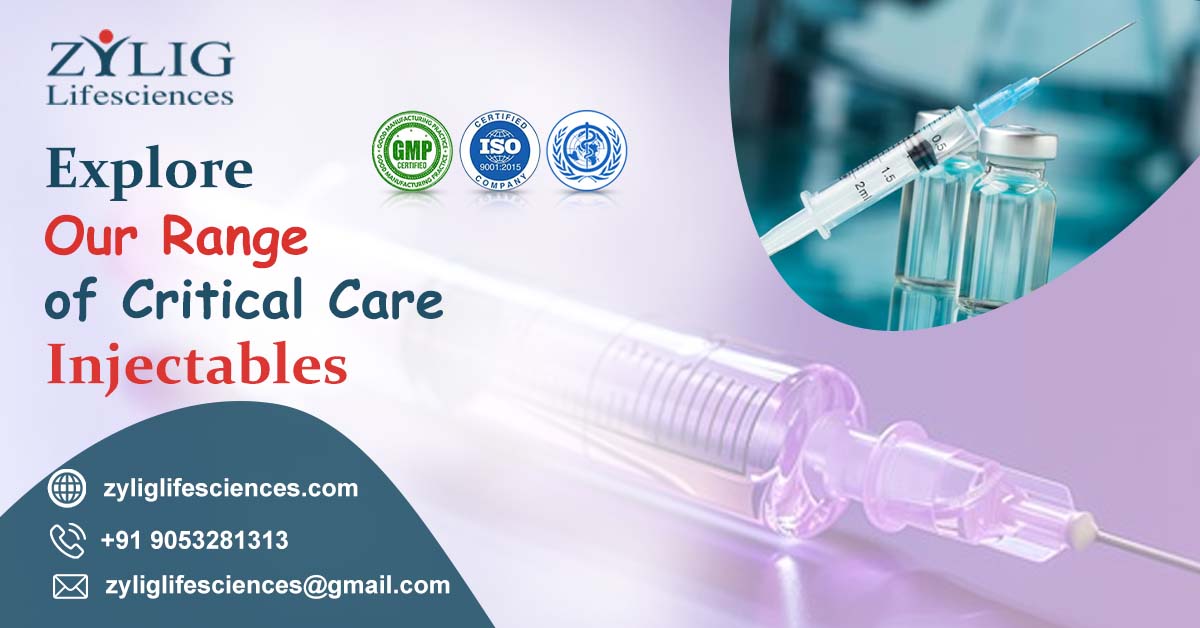Critical care injections are essential when there is an emergency medical condition or crisis, such as a severe infection. These injections are also a way of giving necessary medications for control of blood pressure and antibiotics for the patients. Hence, critical care injections are often a bridge for patients needing rapid medical treatment or intervention. As a result of their significance in healthcare, you need a reliable manufacturer that maintains the highest quality standards.
Furthermore, you can trust Zylig Lifesciences, which is one of the best critical care injection manufacturers in Baddi, which involves broad-spectrum antibiotics, vasopressors like norepinephrine and dopamine, antifungals, and essential electrolytes. With WHO-GMP and ISO certifications backing our manufacturing processes, you receive products that meet global quality benchmarks while remaining accessible through competitive pricing.
What Makes Critical Care Injections Essential
The medical landscape demands swift response in life-threatening situations where every second counts. Critical care injections undertake the front lines of emergency medical response, most significantly in the treatment of severe infections, and the implementation of advanced treatment with organ dysfunction.
Critical care injections are used by medical professionals because they produce immediate effects when injected into the bloodstream, which is essential for stabilizing patients. Furthermore, these medications are chosen by physicians for their limited half-life, thus limiting longer-term adverse effects and maximizing therapeutic response. Additionally, in cases of acute adrenal failure, immediate administration of hydrocortisone through injection becomes necessary to prevent cardiovascular collapse.
Baddi Emerges as Hub for Injectable Manufacturing
• Nestled in the foothills of Himachal Pradesh, Baddi has established itself as India’s pharmaceutical capital, with injectable manufacturing at its core. Through strategic development, this industrial town now contributes approximately 35% of India’s pharmaceutical production.
• The region’s dominant position is driven by a number of critical factors. First, high-tech manufacturing plants that meet national and international regulatory standards. Then this location allows for easy access to raw materials that simplify the process of production.
• The injectable market forecasts substantial growth, projecting a CAGR of 8.3% between 2022 and 2030. So, this growth is in direct line with the increasing demand for injectable antibiotics, vaccines, and cancer treatment products.
• Manufacturing facilities in Baddi operate under stringent WHO-GMP guidelines, ensuring product safety, quality, and efficacy.
• The region’s pharmaceutical ecosystem comprises more than 700 companies, ranging from small-scale units to large multinational corporations. These critical care injection manufacturers in Baddi lay claim to the pleasant climate of Baddi, which makes it just the perfect place to store and produce pharmaceuticals.
• Baddi Business Park offers industrial plots and warehousing that comprise crucial infrastructure. Operating under the Central Drug Standard Control Organisation’s regulatory framework, these facilities maintain consistent quality standards across production cycles.
Storage Solutions Maintain Product Efficacy
Proper storage conditions play a vital role in maintaining the effectiveness of critical care injections. According to established guidelines, these medications require storage temperatures between 2-8 degrees Celsius to preserve their molecular structure and therapeutic properties. Organisations handling critical care injections should establish comprehensive local policies encompassing:
• Responsibility and accountability protocols for medicine storage
• Strategic planning of storage areas
• Temperature monitoring and recording procedures
• Regular maintenance of refrigeration units
• Transportation temperature control measures
Storage requirements result from multiple factors, primarily chemical degradation of active ingredients, physical deterioration of medicine containers, and prevention of microbial growth. Therefore, maintaining proper refrigeration extends shelf life and safeguards patients from receiving compromised doses.
Conclusion
Consequently, critical care injections undoubtedly stand as cornerstone elements in modern emergency medicine. Through stringent manufacturing processes in pharmaceutical hubs like Baddi, these life-saving medications meet global quality benchmarks while remaining accessible. Proper storage solutions, particularly temperature-controlled environments between 2-8 degrees Celsius, ensure these medications maintain their therapeutic effectiveness until administration. Manufacturing excellence, demonstrated by facilities like Zylig Lifesciences, points toward continued advancement in injectable medication production.
Frequently Asked Questions
Q1. How does Baddi contribute to the manufacturing of injectable medications?
Baddi, located in Himachal Pradesh, has become India’s pharmaceutical capital, contributing about 35% of the country’s pharmaceutical production. Companies in Baddi produce a wide range of injectable medications, including antibiotics, vaccines, and oncology products, under strict WHO-GMP guidelines.
Q2. What are the proper storage conditions for critical care injections?
Critical care injections typically require storage temperatures between 2-8 degrees Celsius to maintain their effectiveness. To maintain the molecular structure and therapeutic characteristics of these medications, proper storage is essential. A qualified storage policy—we need to have a strong temperature monitor system at health facilities to ensure that these injections are still in good condition.
Q3. How do manufacturers ensure the quality of critical care injections?
Manufacturers of critical care injections, such as those in Baddi, operate under stringent WHO-GMP guidelines and often hold ISO certifications. Everything from sourcing of raw materials to testing of the final product and every point in the production process maintains strict quality control. Many of these facilities also hold Good Manufacturing Practices certification from several countries to guarantee that their products are of international standards.

